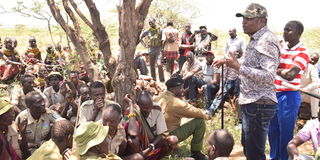Governor Lelelit in balancing act as he faces drought, insecurity

Samburu Governor Lati Lelelit says the plan is to increase school enrolment
A biting drought and escalating banditry in Samburu have left Governor Jonathan Lelelit's young administration unsettled, two months after he took office.
Mr Lelelit has not even finished forming his government, but he is already grappling with a host of challenges in the semi-arid region.
He must weigh his priorities against available county resources to mitigate a humanitarian crisis caused by a worsening drought, hunger and deteriorating insecurity.
He acknowledged that widespread hunger could become a catastrophe if the most vulnerable people are not helped, having been affected by a locust invasion, drought and resource-based conflicts.
Officials say as many as 150,000 people in the pastoral region are at risk of extreme hunger amid a fourth consecutive season of poor rains.
His administration faces the headache of balancing development projects and offering humanitarian aid to thousands of pastoralists who don’t have food.
"We are not thinking of any meaningful project now because our people are really suffering. Our focus remains on offering required interventions to help starving pastoralists," Governor Lelelit said.
The National Drought Management Authority (NDMA) places Samburu in the alarm stage. After browse vegetation was depleted and water sources dried up, many residents have left with their livestock in search of water and pasture.
The dry spell has also resulted in a significant reduction in herd sizes because of deaths, the NDMA says in a report. Communities have reported many deaths due to drought, and most herders are selling off their stock at throwaway prices. The surviving cattle have poor body conditions.

Samburu Governor Jonathan Lelelit speaks to a group of Turkana herders during a peace meeting in Charda area, Samburu North. The county is planning to establish fortified security camps for community rangers in the region to stem rampant banditry activities.
Mr Lelelit's administration is also grappling with resurgent bandit attacks. Despite increased efforts to curb the violence, it seems to be worsening, with gun-slinging criminals devising new tactics to evade government traps.
Illegal guns in the hands of civilians have turned this part of the country into a nightmare for travellers, herders and the business community, with recent attacks reported in Poro, Loosuk, Longewan, Pura and Lorukoti.
"There can be no development where there is no peace. This is practically impossible," he said.
He spoke about his plans to establish fortified security camps in the troubled region. The camps, which he said will have a structured administration, will be occupied by local community rangers.
He said this is one of the measures his administration will take as a homegrown solution to end endemic cattle rustling in the region.
The rangers, who are yet to be recruited, are expected to work closely with local police officers to tame banditry in troubled areas including Marti, Nachola, Baragoi, Kawap, Ngilai and Suyian.
"We have decided to establish fortified security camps with structured administration in strategic locations for community rangers. We now ask the national government to help us in our efforts" Governor Lelelit said.
Bandits carry sophisticated weapons and often group themselves into troops of about 60 and ambush homesteads (manyattas) at dusk, night or dawn.





